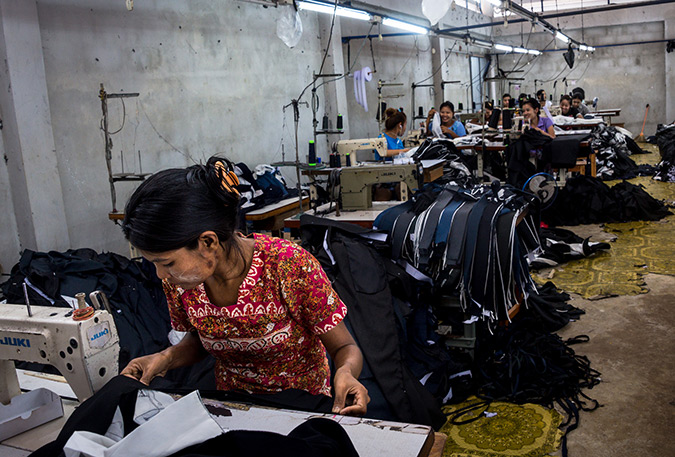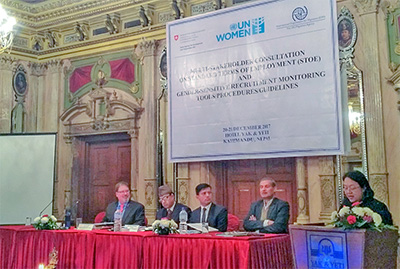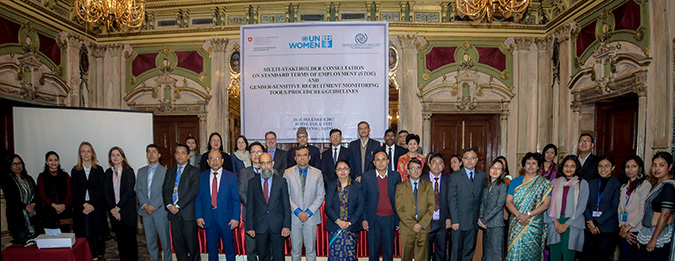Too many women migrants are working without clear, safe and fair contracts
Date:
Author: Chris Dickson
Hundreds of thousands of women migrant workers are labouring under contracts they don't understand, in languages they cannot read, or that provide inadequate protection of their rights. The available template for Standards Terms of Employment (STOE) addresses this but needs to be better implemented by employers and recruitment agencies, as well as in labour agreements between countries.
Bangkok, Thailand — More than 3.1 million South Asian women travelled to work in the Middle East in 2015, most of them as domestic workers, according to the United Nations (UN). Many signed contracts written in Arabic without translation, that contained unreasonable or illegal clauses, or omitted any mention of working hours or sick leave, in violation of the workers' basic rights. This leaves women vulnerable to abuse and exploitation, even where these violations of their rights may not directly contravene their contract or local laws.

Once in position in the host country - especially in the isolation of domestic employment - it is very difficult for women workers to fully assess the vulnerabilities they are exposed to by their contract, let alone seek remedy. As a result, they too often face risks including forced labour, confinement, informal (and therefore unregulated) employment, confiscation of legal documents, trafficking, physical abuse and sexual violence, and even "disappearance."
This can and must be better prevented by the wider use of standardized terms and conditions of employment, to be established and agreed to by all parties before signing the contract.
Such a template for Standard Terms of Employment (STOE) has been developed by UN Women with support from the Swiss Agency for Development and Cooperation (SDC). In some cases, it is referenced in national legislation or bilateral labour agreements, but these provisions are often not applied effectively, according to a recent study commissioned from the International Organization for Migration (IOM) by UN Women, under a project funded by the SDC.
"There is a colossal gap between the Standard Terms of Employment template (STOE) and the employment contracts that are used for female labour migration," the study said. "Without addressing the gaps that exist in the current female labour migration, applying an idealistic contract template is not feasible."

The right to a clear and fair contract is enshrined among others in the ILO Convention on Domestic Workers (No. 189). This aims to ensure decent working hours, decent pay, time off for rest and holidays, inspection of homes where the domestic worker is employed and the right to join a trade union. Its Article 7 decrees that domestic workers must be informed of the terms and conditions of employment in an appropriate, verifiable and easily understandable manner. However, the ratification of this Convention is low despite the support extended from South Asian and Arab countries.
"Formalizing women's roles with official contracts is a basic component to ensure their access to safe and fair labour migration," Sukanya Thongthumrong, Officer-in-Charge of Regional Migration and Women's Economic Empowerment of UN Women Asia-Pacific, said during a stakeholder consultation in Kathmandu in December.
"The guiding gender-responsive template [...] can help move towards the implementation of fair, transparent and gender-sensitive STOEs, which are a powerful tool to promote the ethical recruitment of women."
The template could also be more often used as a basis for bilateral labour agreements between South Asian sending countries and the Middle Eastern host countries, the study found. The countries' respective Labour Attachés play a critical role in this process, it said.

Officials, diplomats, delegates from international organizations and representatives of civil society were in the Nepalese capital on 20 and 21 December to discuss the findings of the report, and how best to include gender-sensitive priorities in such bilateral agreements in future.
Economic migration can be a boon to all parties, but only when the rights of all are properly safeguarded. "Migration has made multi-dimensional positive contribution on socio-economic development of countries of origin and destination," Paul Norton, Chief of Mission of IOM Nepal, said at the Kathmandu meeting. But, he said, "migration also brings in associated potential risks of exploitation and abuse of migrant workers, and women migrant workers are the most vulnerable."
Women migrant workers must be able to make informed choices about their employment, they must be able to understand and consent to their contracts, and be confident that those contracts meet certain standards, and will be respected or enforced. Only then will they be able to make the most of the opportunities for themselves, their families, their futures and for the communities that host them.
For more information, contact;
Sukanya Thongthumrong, Officer-in-Charge
Regional Migration and Women's Economic Empowerment
UN Women Regional Office for Asia and the Pacific
Tel: +66 2 288 1383 | E-mail: [ Click to reveal ]